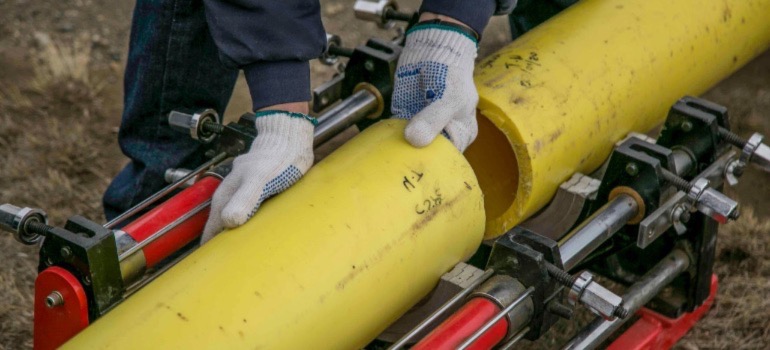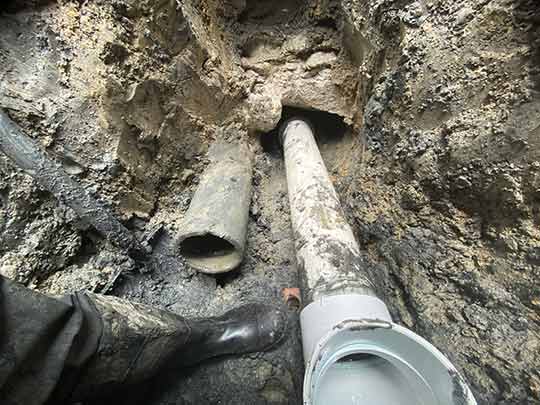
One of the most common mistakes homeowners make is improper disposal of waste. It’s essential to understand that not everything is meant to go down your drains or toilets. Items such as paper towels, wet wipes, feminine hygiene products, and grease can easily cause blockages in your sewer system. These materials do not break down as easily as toilet paper and can accumulate over time, leading to significant clogs. To prevent this, always dispose of such items in the trash and avoid pouring grease down the sink. Using drain screens can also help catch debris before it enters your pipes.
Ignoring Small Leaks and Drips
A small leak or drip might seem inconsequential at first, but ignoring it can lead to much larger issues. Over time, even minor leaks can cause significant damage to your sewer system and your home’s foundation. Continuous water exposure can weaken pipes, leading to cracks and eventual breaks. Regularly check for leaks in your plumbing system, and if you notice any, address them promptly. Routine maintenance and inspections by a professional can help catch these small problems before they escalate.
Planting Trees and Shrubs Near Sewer Lines
Many homeowners enjoy the aesthetic appeal of trees and shrubs in their yard, but planting them too close to sewer lines can cause serious problems. The roots of these plants naturally seek out water sources, and your sewer lines are an attractive target. Over time, roots can penetrate and grow inside the pipes, causing blockages and even pipe breakage. When planning your landscaping, ensure that trees and shrubs are planted a safe distance away from your sewer lines. Speaking with a professional landscaper or plumber can help you understand the safe planting distances for various plant species.
Using Chemical Drain Cleaners
When faced with a clogged drain, many homeowners reach for chemical drain cleaners as a quick fix. However, these products can do more harm than good. The harsh chemicals can erode and weaken your pipes over time, leading to leaks and breaks. Additionally, if the cleaner does not completely clear the clog, it can sit in the pipes and cause further corrosion. Instead of relying on chemical drain cleaners, use mechanical methods such as a drain snake. For persistent clogs, it’s best to call a professional hydro jetting plumber to handle the issue safely.
Overloading the Garbage Disposal
Your garbage disposal is a useful tool, but it has its limitations. Overloading it with large quantities of food waste or disposing of inappropriate items such as coffee grounds, eggshells, or fibrous vegetables can lead to clogs and damage. Always run cold water while using the disposal to help solidify any grease or fat, allowing it to be chopped up more effectively. Feed food waste into the disposal slowly and avoid putting large amounts at once. Regularly clean the disposal to prevent buildup and maintain its efficiency.
Neglecting Regular Maintenance
Just like any other part of your home, your plumbing system requires regular maintenance to function properly. Neglecting routine inspections and upkeep can lead to unexpected sewer problems and costly repairs. Schedule regular inspections with a licensed plumber to check for potential issues such as leaks, clogs, or pipe corrosion. Routine maintenance can include cleaning your drains, having your sewer line camera inspected, and checking for signs of wear and tear. By staying proactive, you can catch problems early and avoid major sewer repairs.

Whether you’re installing new pipes or replacing old ones, it’s essential to hire a professional plumber who is experienced and knowledgeable.
Inadequate Pipe Insulation
In colder climates, inadequate pipe insulation can lead to frozen pipes, which can cause severe damage to your home’s plumbing system. When water inside the pipes freezes, it can expand and cause a burst plumbing pipe emergency, leading to significant water damage and costly repairs. Ensure that your pipes, especially those in unheated areas such as basements, attics, and crawl spaces, are properly insulated. During extreme cold spells, letting a trickle of water run through the pipes can prevent freezing. It’s also a good idea to keep your home’s thermostat at a consistent temperature to avoid pipe freezes.
Improper Pipe Installation
One of the crucial aspects of a well-functioning plumbing system is proper pipe installation. Poorly installed pipes can lead to a variety of issues, including leaks, improper drainage, and sewer backups. Whether you’re installing new pipes or replacing old ones, it’s essential to hire a professional plumber who is experienced and knowledgeable. Proper installation ensures that pipes are appropriately sized, securely connected, and correctly positioned to prevent future problems.
Understanding Your Home’s Plumbing Layout
Many homeowners are unfamiliar with their home’s plumbing layout, which can lead to issues when problems arise. Understanding where your pipes and sewer lines are located can help you identify potential trouble spots and address them before they escalate. Take the time to learn about your plumbing system, including the location of shut-off valves and access points. This knowledge can be invaluable in an emergency and can help you perform routine maintenance more effectively.
Ignoring Warning Signs
Sewer problems often provide warning signs before they become severe, but many homeowners overlook these indicators. Slow drains, foul odors, gurgling sounds, and water backups are all signs that something may be wrong with your sewer system. Ignoring these warning signs can lead to more extensive damage and costly repairs. If you notice any of these symptoms, it’s essential to address them promptly. Contact a professional plumber to diagnose the issue and recommend the appropriate course of action.
In Summary
Understanding and avoiding common mistakes can significantly extend the life of your home’s plumbing system and prevent the need for costly sewer repairs. Proper waste disposal, regular maintenance, and being mindful of what goes into your drains are all crucial steps in maintaining a healthy sewer system. By being proactive and attentive to your home’s plumbing needs, you can avoid many of the common pitfalls that lead to sewer problems. If you’re ever unsure or encounter a persistent issue, don’t hesitate to seek professional assistance. Taking these precautions can save you time, money, and stress in the long run.

